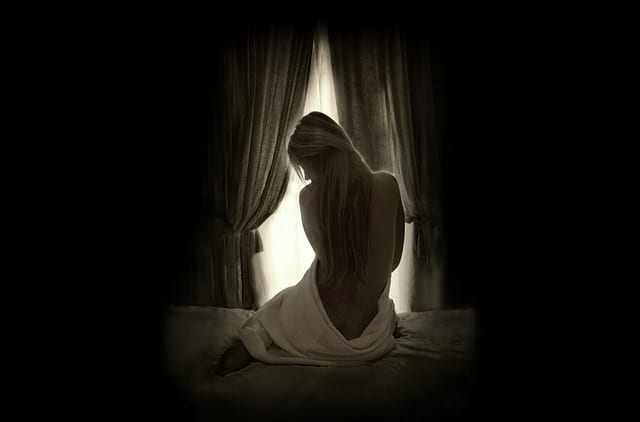Like the Hopper Man
Tonight, I turn on the ‘Easy Listening’ channel and shadow dance under an old moon breaking improbably through half-opened, weathered window shutters. As I do, I retreat into the fog of memory, to—
My wife walks in and catches me, and in a maddened impulse I blurt out everything about the girl.
“You’re seeing someone?” she asks. Her voice is flat and unguarded and dropped to almost a murmur.
“No, no,” I protest shrilly, “it’s not that—it’s just—just someone I knew a long time ago that I—that I can’t stop thinking about.”
“Hmff,” she shrugs, flumping on the bed, “even worse—you’re dreaming about her.”
Slumped on the edge of the bed, she looks like the woman in Hopper’s ‘Hotel Room.’ Only she’s not checking a timetable, yet just as tired and lonely as the Hopper woman, and as sunken into her own thoughts.
I pace and pant, hands trembling, face twitching. Though tearing up, I can still make out her clouded brow and deaf-looking, cavernous eyes.
A merciful stillness follows.
Then I break into the revolving thoughts of our hot silence with a rant about the girl who made me feel—
Feel! I howl, and splutter something about letters, about how I covet those letters.
Then, sensing, not its menace, but nostalgic embrace’s first thrilling throbs, I soliloquize:
“A dancing shape under the big crystal ball throwing reflected spots of light on a smile so warm, a cheek so soft, creating an image to startle and haunt. I feel again that magical glow just thinking of you . . . the breathless charm that catches my eye, stills my heart, silences my tongue. That girlish laughter, that sweet conversation—you make me dream by the look in your eyes. . .. Cry, and I know I’ll have to hold you . . ..”
“How foolish after all this time! But I need those letters,” I tell her, my wife, who remains sitting on the edge of the bed, like, as I say, Hopper’s woman, except now she’s holding her head between her hands, my wife is, her spider fingers long, slender shadows in the improbably electric, fan-shaped ray of the old moon’s light. “They’re dear to me.” I tell her in sharp, swift tones.
Then my breath catches in my chest, and presto! They’re near to me—all the stumbling words that tell what our hearts felt—they’re here with me, the remnants dear to me, and the way Hopper’s woman looks tonight.
Terrible things to tell your wife, extinguishing things, those wraiths of memory.
Then I ask her, crazily, to retrieve from somewhere the someone who said something or other about how it’s only saints and poets who realize life while they live it every, every minute. In her pause, I go on about how I want to go back—
Ah! then it hits me. Emily! Of course, dear, dead Emily of Our Town, who wants to go back because she knows better now. She can do better. Me, too—“I can do better now. I know I can,” I tell my wife in a vein brisk and bold.
Then a thought abruptly freezes me: Maybe I can’t, I couldn’t—
Can I? Could I? I importune, as if—
The light fades.
The room dims.
And there she sits, motionless, now on the floor, slumped against the bed, wearing only a white sleeveless shirt, her left arm stretched between her naked legs, her right arm bent at the elbow resting atop the bed.
And there she rests, delicately haggard, like a Hopper nude, my wife on a sheet that is falling from an unmade bed.
She temporizes. Then she speaks, softly, hieratically, though with a strong vein of sympathy that carries a gentle, ghostly caress, of the “help” I need.
“Help?” I ask faintly.
She knows of someone, she says.
“What?” I ask, in the glassy cream-yellow-light.
She replies in a brittle, matted voice, “Her picture’s on the counter.”
“You mean the real estate agent? Because, y’know, that’s who I think she is, the woman in the picture in the kitchen.”
“She’s not a real estate agent,” she says, “she’s a….”
Her voice clots in her throat, and I’m left to wonder who she is, the cutout, who, frankly,—now that I take a good long look at her in the strong, puck-lights of the countertop, at her still and indifferent persona,— looks nothing like a real estate agent. But, naturally, I thought she was because, y’see, we’re thinking of—what? downsizing, yes, downsizing, as they say, now that—
But now I can plainly see she’s not that, the woman in the cutout. She’s, well, let’s face it—she’s a Hopper woman, the one in “Intermission.” Even to sitting on a chair, hands resting on thighs, feet crossed at ankles— detached and indifferent to her surroundings. No, no, not at all like a real estate agent, the cutout.
When I return, to the bedroom, my wife is settled in, half-naked, her rounded neck and shoulders those of a voluptuous, reclining nymph.
Sensing my presence and curiosity, she says in a voice barely audible because she’s facing the wall, “I had an intuition.”
Of what? I ask, sensing her bosom heave with the measured rise and fall of her shoulders.
And I recall how the girl used to slip her arm through mine, and my voice chokes in my throat.
Then I take my place on the bed, sitting slump shouldered on its edge, my back to my wife, my head bent, staring with unrelenting eyes at the fanciful old moonbeam spilling across the toe of my left foot, like the Hopper man in ‘Excursion into Philosophy.’






















